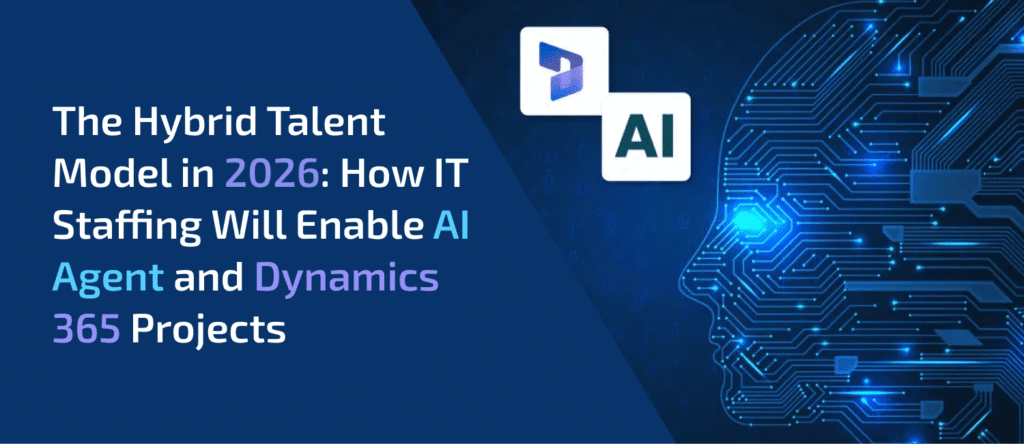As businesses accelerate toward automation and digital transformation, a new staffing paradigm is emerging: the Hybrid Talent Model. This approach blends in-house expertise with on-demand external talent to drive innovation, flexibility, and cost efficiency.
By 2026, the hybrid model will become a cornerstone for organizations adopting AI Agents, Microsoft Dynamics 365, and other advanced enterprise solutions. Companies that master this balance will thrive in an environment where both human intelligence and artificial intelligence collaborate seamlessly.
1. What Is the Hybrid Talent Model?
The Hybrid Talent Model combines full-time employees, contract specialists, and AI-augmented roles into a single operational ecosystem. Unlike traditional outsourcing, it enables organizations to:
- Scale technical expertise rapidly.
- Integrate specialized talent for short or high-impact projects.
- Leverage global resource augmentation while maintaining core teams.
- Introduce AI automation into workforce planning and operations.
By 2026, leading enterprises will treat workforce design as a dynamic, data-driven strategy, not a static HR process.
2. Why 2026 Is the Year of Hybrid Staffing
The global IT talent shortage, estimated to reach 85 million unfilled positions by 2030, is already prompting companies to reassess their staffing models.
By 2026, AI-driven resource allocation and cross-border collaboration will redefine how teams are built:
- AI Agents will handle repetitive coordination and reporting tasks.
- Human experts will focus on innovation, customization, and oversight.
- Cloud platforms like Dynamics 365 will enable distributed teams to work as one ecosystem.
This synergy will not only improve project delivery speed but also enhance cost efficiency and talent retention.
3. The Role of Hybrid Teams in AI Agent Projects
AI Agents require diverse skills from prompt engineering and model integration to data ethics and automation governance.
In 2026:
- Hybrid teams will allow businesses to combine AI researchers, data engineers, and business analysts from multiple geographies.
- External specialists can accelerate pilot deployments and train internal teams.
- Agentic AI systems will support project management by autonomously scheduling tasks, tracking progress, and optimizing workloads.
The result: a self-evolving collaboration cycle between human expertise and machine intelligence.
4. Empowering Dynamics 365 Implementations Through Hybrid Staffing
Microsoft Dynamics 365 projects demand cross-functional collaboration from CRM customization to Power BI integration and process automation.
Hybrid talent models empower organizations by:
- Integrating certified Dynamics consultants with AI-enabled automation engineers.
- Ensuring continuous delivery through follow-the-sun resource models.
- Using AI Agents to streamline workflows, manage dependencies, and ensure seamless data synchronization.
By 2026, PointofIT foresees most enterprise-scale Dynamics 365 projects running on blended human-AI workforces, enhancing scalability and time-to-market.
5. Benefits of the Hybrid Talent Model
- Agility: Rapidly scale teams as project needs evolve.
- Expertise: Access top-tier skills without long-term overheads.
- Innovation: Enable collaborative co-creation between internal and external talent.
- Efficiency: Reduce costs via AI-assisted operations and smart automation.
- Continuity: Maintain operations round-the-clock with distributed teams.
6. Challenges and How to Overcome Them
While promising, hybrid staffing in 2026 also brings challenges:
- Integration Complexity: Aligning diverse tools and workflows.
- Cultural Differences: Managing cross-border collaboration effectively.
- Data Security: Ensuring safe access and compliance in shared environments.
- AI Oversight: Balancing automation with ethical governance.
To succeed, organizations will need robust communication frameworks, AI transparency policies, and trusted IT partners like PointofIT to build scalable models.
7. PointofIT’s Vision for 2026
At PointofIT, we believe the future of work lies in smart, hybrid ecosystems where humans and AI agents collaborate seamlessly.
Our resource augmentation and Dynamics 365 implementation services empower businesses to:
- Build agile, future-ready hybrid teams.
- Integrate AI Agents for real-time decision-making.
- Deliver faster, smarter, and more resilient digital transformation projects.
Final Words
The Hybrid Talent Model is not just a staffing trend; it’s the framework for the future of intelligent business.
By 2026, organizations that adopt this model will enjoy unprecedented flexibility, speed, and innovation, particularly in complex domains such as AI Agents and Dynamics 365.
In this hybrid era, success will belong to companies that harness the best of both worlds, human creativity and AI intelligence.
